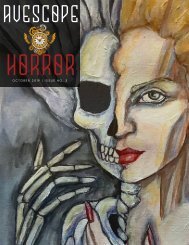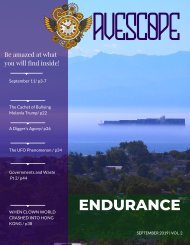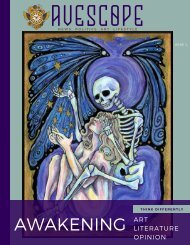Avescope Memento Mori
Avescope Memento Mori. Remember Death. An amazing new magazine about death and remembrance. Art. Photography. History. Fiction. Culture. Poetry. Avescope Memento Mori has it all. This issue is so amazing, it almost makes julienne fries. Thanks to all our contributors: Catherine Clark, Joanna Hatton, Tamsin McKenna-Williams, Catherine Jackson, Blackbird's Photography, Auguste von Osterode, David Simon, Anike Kirsten, Kimm Fernandez, Neva Lee, Tiffany Tong, Matthew Sheetz, Christopher Antim, Karen Lee, LD Towers
Avescope Memento Mori. Remember Death. An amazing new magazine about death and remembrance. Art. Photography. History. Fiction. Culture. Poetry. Avescope Memento Mori has it all. This issue is so amazing, it almost makes julienne fries. Thanks to all our contributors:
Catherine Clark,
Joanna Hatton,
Tamsin McKenna-Williams,
Catherine Jackson,
Blackbird's Photography,
Auguste von Osterode,
David Simon,
Anike Kirsten,
Kimm Fernandez,
Neva Lee,
Tiffany Tong,
Matthew Sheetz,
Christopher Antim,
Karen Lee, LD Towers
You also want an ePaper? Increase the reach of your titles
YUMPU automatically turns print PDFs into web optimized ePapers that Google loves.
By the time World War II began, my grandfather had<br />
moved himself and his young family to Canada. Settling<br />
on the west coast meant that it was important to keep at<br />
least one eye permanently on the beach – in case the<br />
Japs landed (Spoiler: They didn’t).<br />
By all accounts, crippling psychological damage was the<br />
common thread among veterans of the First World War,<br />
perhaps more so than any other military campaign since.<br />
That’s not to say that those who fought in World War II<br />
(or any other war) didn’t suffer trauma. They just seemed<br />
to come out of the experience tough as nails, rather than<br />
visibly grappling with shell shock and unable to function.<br />
In fact, my Second World War veteran relatives had the<br />
most tenacity, pragmatism and balls of cast iron of<br />
anyone I knew as a child. The opposite was true for the<br />
generation that had endured World War I – what was left<br />
of it, at least. It’s true that I didn’t ever know any of my<br />
Great War elders while they were still alive, but<br />
everything I’ve been able to learn about their post-war<br />
lives suggests that they carried on under an unspeakable<br />
pall.<br />
I don’t agree with the idea that whatever doesn’t kill us<br />
makes us stronger. Some damage is just that. No one is<br />
any better or stronger for it. In fact, the trenches of World<br />
War I simply broke those who survived. Sure, they were<br />
tough – and also haunted by recollections they were too<br />
ashamed to articulate. Remember, this was the military<br />
that shot men for what was then considered cowardice.<br />
Maybe World War I didn’t unite people behind a<br />
common cause that felt just and righteous the way going<br />
after Hitler did?<br />
My World War II grandfather missed the feeling of doing<br />
something vitally important when civilization itself<br />
seemed to be threatened. He appeared strong and<br />
practical to me, and also very calm and unflappable.<br />
Similarly tenacious and stonily determined was an uncle<br />
on my father’s side, who served in the Royal Air Force in<br />
World War II and spent five years as a prisoner in a<br />
German camp. Believe it or not, there are parts of his<br />
story that are actually funny…<br />
I knew him as ‘’Uncle Mick.’’<br />
Manville Charles Fenn was a Royal Air Force nose gunner<br />
and wireless operator in a Wellington Bomber that was<br />
shot down in the Netherlands in December of 1940. Their<br />
mission was the last one to depart before fog made any<br />
further flights across the channel impossible. It was also<br />
on account of the fog that when their bomber crash<br />
landed, they weren’t entirely sure where they’d ended up.<br />
The crew decided to take a look around, minus the pilot<br />
whose injuries made it impossible for him to be moved<br />
(He survived, by the way.). Eventually, they found a road<br />
sign – in Dutch, of course.<br />
‘’I think we’re in Wales,’’ one of them ventured. Hollywood<br />
could not have devised a better line. What followed<br />
would also have made for a good screenplay. I’ve<br />
speculated on who was more surprised when the group<br />
bumped into a German patrol. (My guess would be the<br />
guys who thought they were in Wales.)<br />
‘’For you, the war is over,’’ is another line I thought was<br />
only ever uttered in movies. But no, it was real. My uncle<br />
remained a prisoner of war for the next five years,<br />
although not without some escape attempts (including<br />
one in a latrine, which miraculously did not result in<br />
dysentery).<br />
Not surprisingly, no one could stand their ground quite<br />
like Uncle Mick. But to call him stubborn would be<br />
inadequate. ‘’Carved from granite,’’ would be more<br />
appropriate. I don’t want to think that it takes a world war<br />
to forge that kind of personal strength. Still, no<br />
generation since has ever been quite the same. Maybe<br />
the best form of remembrance is to try and cultivate our<br />
own inner granite as best we can, to just do better. With<br />
any luck, I will never discover how I’d handle myself<br />
<strong>Avescope</strong> | 8





